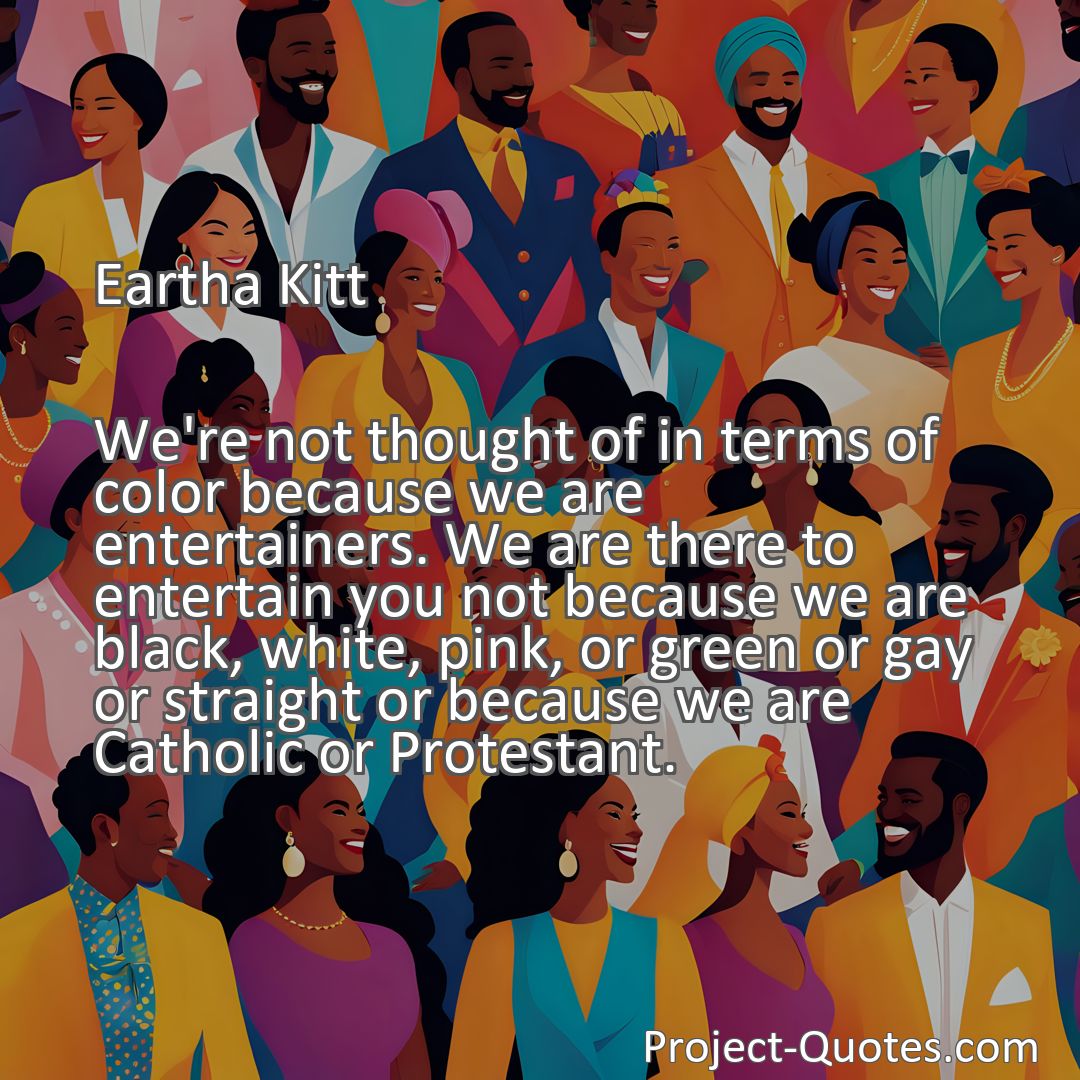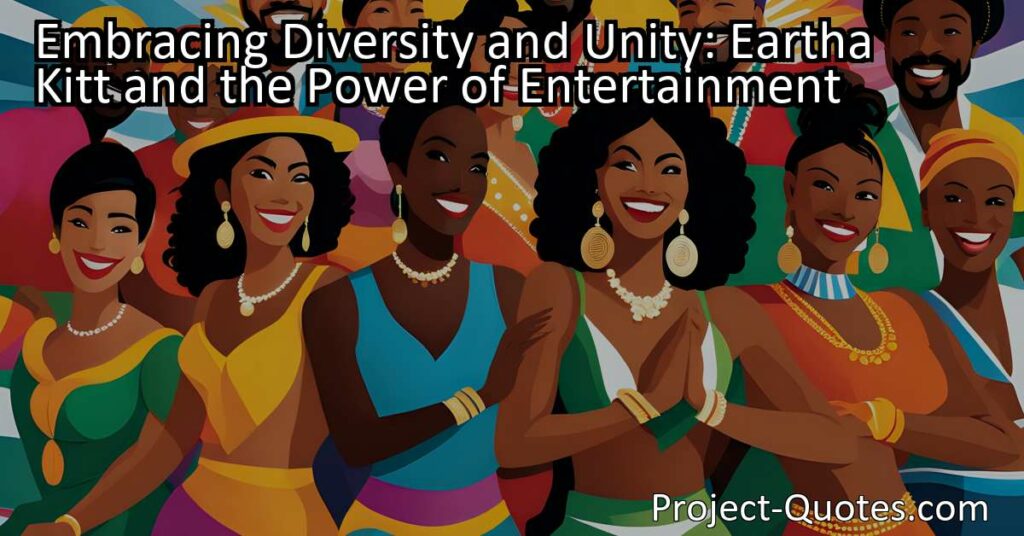We’re not thought of in terms of color because we are entertainers. We are there to entertain you not because we are black, white, pink, or green or gay or straight or because we are Catholic or Protestant.
Eartha Kitt
Embracing Diversity and Unity: Eartha Kitt and the Power of Entertainment This engaging summary explores how the legendary performer Eartha Kitt recognized the ability of entertainment to transcend societal labels and prejudices. It emphasizes the impact of entertainment in uniting diverse backgrounds and promoting inclusivity while urging readers to support underrepresented artists and advocate for a more inclusive industry. By embracing the power of entertainment, we can break down barriers and create a world where individuals are valued for their talents and character above all else.
Table of Contents
- 1 We’re not thought of in terms of color because we are entertainers. We are there to entertain you not because we are black, white, pink, or green or gay or straight or because we are Catholic or Protestant.
- 2 Eartha Kitt
- 3 Meaning of Quote – We’re not thought of in terms of color because we are entertainers. We are there to entertain you not because we are black, white, pink, or green or gay or straight or because we are Catholic or Protestant.
- 4 Freely Shareable Quote Image
- 5 Related
Meaning of Quote – We’re not thought of in terms of color because we are entertainers. We are there to entertain you not because we are black, white, pink, or green or gay or straight or because we are Catholic or Protestant.
In the words of the legendary performer Eartha Kitt, “We’re not thought of in terms of color because we are entertainers. We are there to entertain you not because we are black, white, pink, or green or gay or straight or because we are Catholic or Protestant.” With this thought-provoking statement, Eartha Kitt brings to light a crucial aspect of entertainment its ability to transcend societal labels and prejudices. In the world of entertainment, what truly matters is the talent, creativity, and dedication that artists bring to their craft, not their race, gender, sexual orientation, or religious beliefs.
Entertainment, whether it be on stage, in film, or through music, has the remarkable power to unite people from diverse backgrounds and perspectives. It serves as a reminder that at our core, we all share a common human experience. When we immerse ourselves in a captivating performance, we are transported to a world where differences dissolve, and we are drawn together by shared emotions and experiences. Our laughter, tears, and applause become a universal language that breaks down barriers and builds connections that transcend age, race, and any other societal classification.
Throughout history, countless entertainers have used their platform to challenge stereotypes and promote inclusivity. They have served as powerful catalysts for social change, using their talent to advocate for equality and justice. Eartha Kitt herself, a trailblazing African-American performer, faced discrimination and prejudice throughout her career. Yet she refused to be limited by these barriers, using her voice and artistry to confront the oppressive norms of her time. Through her resilience and talent, Kitt paved the way for future generations of entertainers to embrace their uniqueness without fear or hesitation.
In today’s world, the entertainment industry continues to be a site of progress and transformation. Increasingly, artists from marginalized communities are reclaiming their narratives and demanding representation on their own terms. Slowly but surely, the homogeneous and exclusive standards of the past are being dismantled, making way for a more diverse and inclusive entertainment landscape. The success of movies like “Black Panther,” which celebrated African culture and featured a predominantly black cast, proves that audiences are hungry for stories that reflect the rich tapestry of the world we live in.
However, it is imperative to acknowledge that while progress is being made, there is still much work to be done. The entertainment industry, like any other, is not immune to systemic biases and prejudices. Marginalized groups continue to face challenges in gaining visibility, recognition, and fair representation. It is important to continue advocating for greater inclusivity, both in front of and behind the scenes.
As consumers of entertainment, each one of us has a role to play in fostering a more inclusive industry. We must actively seek out diverse voices and stories and engage with art that challenges our preconceived notions. By supporting underrepresented artists, we can amplify their voices and contribute to a more inclusive cultural landscape. Furthermore, we must hold the entertainment industry accountable for its shortcomings and push for systemic change that genuinely reflects the diversity of our society.
Beyond the realm of entertainment, Eartha Kitt’s quote holds a powerful lesson for all aspects of life. It reminds us to see people beyond the labels that society places upon them. It urges us to embrace the idea that our differences should not define us but rather serve as points of celebration. Just as entertainment unites us, our shared humanity can bridge divides and create a world that values and respects all individuals, regardless of their race, gender, sexuality, or religious beliefs.
In conclusion, Eartha Kitt’s insightful quote serves as a reminder that entertainment has the potential to transcend barriers and bring people together in a celebration of shared experiences. As we navigate the ever-evolving landscape of the industry, we must strive for greater inclusivity and recognition of diverse voices. By supporting and amplifying underrepresented artists, we can contribute to a more equitable and vibrant cultural landscape. Let us embrace the power of entertainment to break down walls, challenge stereotypes, and foster understanding, thereby creating a world where individuals are valued for their talents and character, not their skin color or any other societal construct.
I hope this quote inspired image brings you hope and peace. Share it with someone who needs it today!


